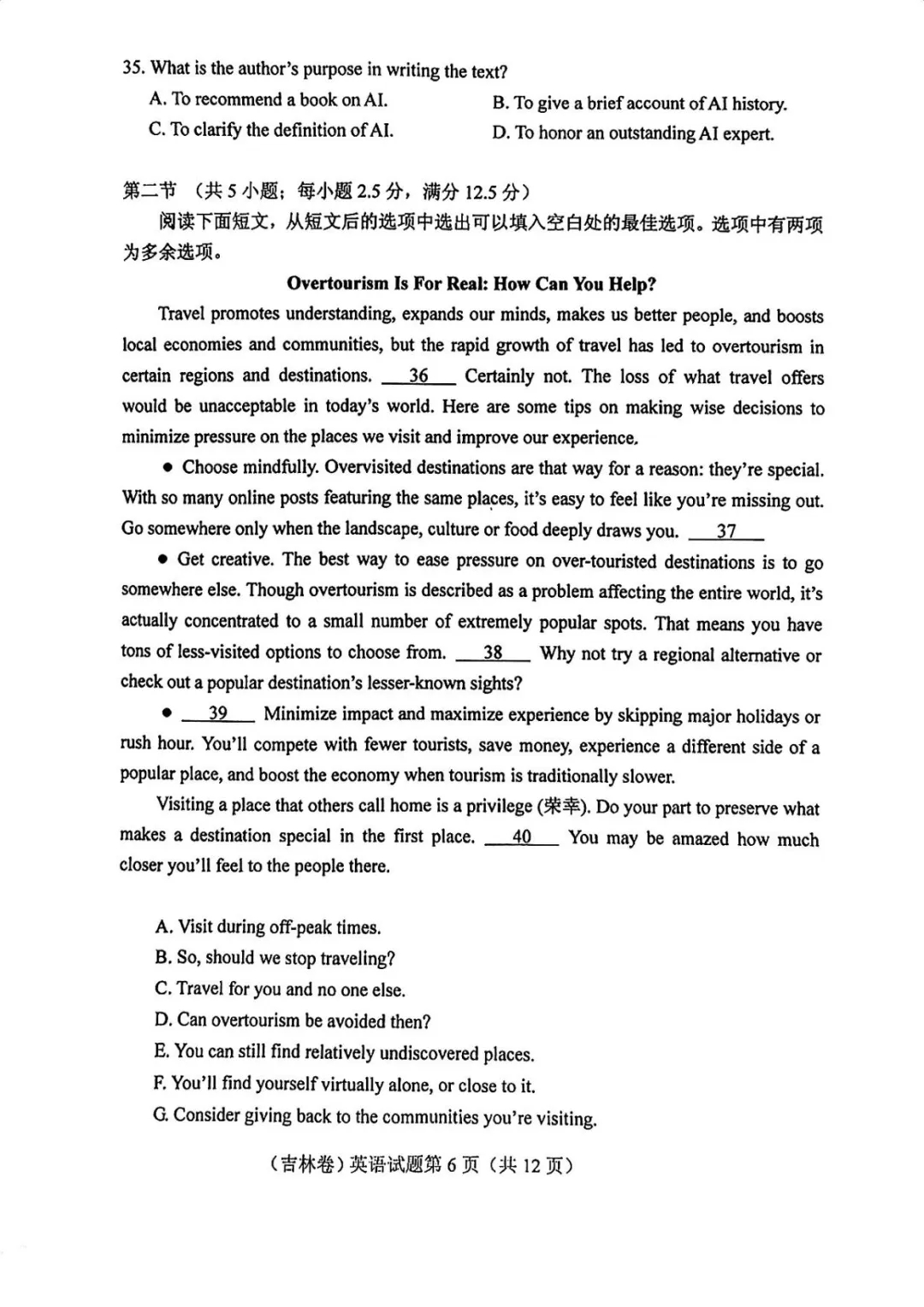2024年高考英語全國卷真題匯總,附英語試卷題型分布及分值一覽(甲卷/新課標Ⅰ、Ⅱ卷)
今年高考中很多省份的考試用卷發生了變化,多數省份采用的都是新課標Ⅰ卷和Ⅱ卷,全國乙卷被取消使用,全國甲卷則共有五個省份進行采用,包括內蒙古、陜西、四川、青海和寧夏。那么2024年高考英語全國卷的題型分布是怎樣的?各類全國卷的真題有哪些?小編已為大家整理了相關資料,快來了解一下吧!

2024高考英語全國卷題型分布及分值一覽
一、新課標卷(包括Ⅰ、Ⅱ)
第一部分:聽力,1-20小題,共兩節,滿分30分。其中第一節共5小題,每小題1.5分,滿分7.5分;第二節共15小題,每小題1.5分,滿分22.5分。
第二部分:閱讀,共兩節,滿分50分。其中第一節【閱讀理解】共15小題,每小題2.5分,滿分37.5分;第二節【七選五】共5小題,每小題2.5分,滿分12.5分。
第三部分:語言運用,共兩節,滿分30分。其中第一節【完形填空】共15小題,每小題1分,滿分15分;第二節【語法填空】共10小題,每小題1.5分,滿分15分。
第四部分:寫作,共兩節,滿分40分。其中第一節【應用文寫作】滿分15分,第二節【讀后續寫】滿分25分。
二、全國甲卷
第一部分:聽力,1-20小題,共兩節,滿分30分。其中第一節共5小題,每小題1.5分,滿分7.5分;第二節共15小題,每小題1.5分,滿分22.5分。
第二部分:閱讀理解,共兩節,滿分40分。其中第一節【閱讀理解】共15小題,每小題2分,滿分30分;第二節【七選五】共5小題,每小題2分,滿分10分。
第三部分:語言運用,共兩節,滿分45分。其中第一節【完形填空】共20小題,每小題1.5分,滿分30分;第二節【語法填空】共10小題,每小題1.5分,滿分15分。
第四部分:寫作,共兩節,滿分35分。其中第一節【短文改錯】共10小題;每小題1分,滿分10分,第二節【書面表達】滿分25分。
2024年高考英語全國卷真題匯總
全國甲卷英語真題
第一部分 聽力 (共兩節,滿分30分)↓↓↓
做題時,先將答案標在試卷上。錄音內容結束后,你將有兩分鐘的時間將試卷上的答案轉涂到答題卡上。
第一節 (共5小題;每小題1.5分,滿分7.5分)
聽下面5段對話。每段對話后有一個小題,從題中所給的A、B、C三個選項中選出最佳選項。聽完每段對話后,你都有10秒鐘的時間來回答有關小題和閱讀下一小題。每段對話僅讀一遍。
例: How much is the shirt?
A. £19.15. B. £9.18. C. £9.15.
答案是C。
1. Where are the speakers going?
A. A new restaurant.
B. A convenience store.
C. Their office.
2. When is the class presentation according to Vicky?
A. On Thursday.
B. On Wednesday.
C. On Tuesday.
3.Why does the woman make the call?
A. To check the price.
B. To make an apology.
C. To cancel her order.
4. What is the probable relationship between the speakers?
A. Husband and wife.
B. Boss and employee.
C. Salesperson and customer.
5. What are the speakers mainly talking about?
A. Their move to a new place.
B. Tom’s friends at school.
C. A sports center.
第二節 (共15小題;每小題1.5分,滿分22.5分)
聽下面5段對話或獨白。每段對話或獨白后有幾個小題,從題中所給的A、B、C三個選項中選出最佳選項。聽每段對話或獨白前,你將有時間閱讀各個小題,每小題5秒鐘;聽完后,各小題將給出5秒鐘的作答時間。每段對話或獨白讀兩遍。
聽第6段材料,回答第6、7題。
6. What does the girl tell her dad?
A. She decides to quit college.
B. She worries about her academic ability.
C. She is unpopular with her classmates.
7. How does the father help his daughter?
A. By telling a funny joke.
B. By sharing his own story.
C. By planning a school tour.
聽第7段材料,回答第8至10題
8. Who is the man?
A. A researcher.
B. A bird watcher.
C. A radio host.
9. When do birds sing quieter?
A. On weekend mornings.
B. During rush hours.
C. In early evenings.
10. What is Dr. Zollinger going to do next?
A. Summarize her studies.
B. Play some recordings.
C. Answer more questions.
聽第8段材料,回答第11至13題。
11. Where was Jena born?
A. In Canada.
B. In Japan.
C. In Australia.
12. How old was Mike when he left Glasgow?
A. Five. B. Six. C. Ten.
13. What do we know about Mike’s parents?
A. They enjoy living abroad.
B. They first met at the age of 20.
C. They will start their own company.
聽第9段材料,回答第14至16題。
14. What is the first question to Mr. Green about?
A. His adventure in space.
B. His physical condition.
C. His doctor’s advice.
15. How does Mr. Green feel about traveling to Mars?
A. It’s unlikely to happen.
B. It’s physically demanding.
C. It’s a chance not to be missed.
16. Which is Mr. Green’s favorite movie?
A. Apollo 13.
B. Blue Earth.
C. Space Station.
聽第10段材料,回答第17至20題。
17. What is the speaker doing?
A. Giving a report.
B. Introducing a musical play.
C. Making an announcement.
18. What are the students expected to do?
A. Cary school flags.
B. Wear fun clothes.
C. Design fancy masks.
19. Where can the parents stand and watch?
A. On the sidewalk.
B. On the playground.
C. In front of the office.
20. What should the students do if they don’t take part?
A. Let their teacher know.
B. Stay in the lecture hall.
C. Do some reading.
第二部分 閱讀 (共兩節,滿分40分)
第一節 (共15小題;每小題2分,滿分30分)
閱讀下列短文,從每題所給的A 、B 、C 、D四個選項中選出最佳選項。
A
Each ARTS FIRST festival is a unique annual celebration of the Harvard community’s artistic creativity. We invite you to join us for the coming ARTS FIRST. We look forward to welcoming you as we showcase the creativity of the Harvard arts community through performances, art exhibitions and art-making activities. The festival is a public event for Harvard and community members of all ages.
Light Awash in Watercolor
Learn about the materials and qualities of watercolor paint with experts from the Harvard Art Museums Materials Lab. Try your hand at some of the painting tricks used by artists whose works will be in the upcoming exhibition of American Watercolors, 1880-1990: Into the Light.
Spineless Artists:Invertebrate Creativity
From webs to cocoons, invertebrates (無脊椎動物) create some of nature’s most delicate and beautiful designs. Join Javier Marin from the Harvard Museum of Natural History to learn how insects and other invertebrates dance, inspire fashion and create art, while making your own spineless artists out of craft (手工藝) materials.
Wheel Throwing
Join instructors from the Ceramics Program and great potters from Quincy, Cabot and Mather Houses for demonstrations using the potter’s wheel. Then create your own masterpiece!
Knitting and Pom-Pom Making
Join the Harvard Undergraduate Knitting Circle to make pom-poms and tassels out of thread, or pick up a pair of needles and learn to knit (編織).
21. What do we know about ARTS FIRST?
A. It is an exhibition of oil paintings.
B. It offers art courses for all ages.
C. It presents recreational activities.
D. It is a major tourist attraction.
22. Which program will you join if you’re interested in drawing pictures?
A. Light Awash in Watercolor.
B. Spineless Artists: Invertebrate Creativity.
C. Wheel Throwing.
D. Knitting and Pom-Pom Making.
23.What can you do together with Javier Marin?
A. Practice a traditional dance.
B. Make handcrafts.
C. Visit a local museum
D. Feed invertebrates.
B
Animals can express their needs using a lot of ways. For instance,almost all animals have distinct vocals (聲音) that they rely on to either ask for help, scare away any dangerous animals or look for shelter. But cats are special creatures who possess amazing vocalization skills. They are able to have entire conversations with humans using meows and you’re able to interpret it. If a pet cat is hungry, it will keep meowing to attract attention and find food. However, when a cat is looking for affection, they tend to produce stretched and soft meows. Meowing starts as soon as a baby cat is brought to life and uses it to get the mother’s attention and be fed.
Cats have many heightened senses, but their sense of smell is quite impressive. They use their noses to assess their environment and look out for any signs of danger. They will sniff out specific areas before they choose a place to relax. However, another way the cats are able to distinguish between situations is by looking for familiar smells. Your cat will likely smell your face and store the smell in its memory and use it to recognize you in the future. That’s why most pet cats are able to tell immediately if their owners were around any other cats, which they don't usually like.
Dogs are known for their impressive fetching habit, but cats take this behavior up a notch. Many cats will find random objects outside and bring them to their owners. This is a very old habit that’s been present in all kinds of predators (食肉動物). Cats bring gifts for their owners to show they love you. These adorable little hunters are just doing something that it’s been in their nature since the beginning of time. So just go along with it!
24. What can be learned about cats’ meowing from the first paragraph?
A. It’s a survival skill.
B. It’s taught by mother cats.
C. It’s hard to interpret.
D. It’s getting louder with age.
25. How does a pet cat assess different situations?
A. By listening for sounds.
B. By touching familiar objects.
C. By checking on smells.
D. By communicating with other cats.
26. Which best explains the phrase “take ... up notch” in paragraph 3?
A. Perform appropriately.
B. Move faster.
C. Act strangely.
D. Do better.
27. What is a suitable title for the text?
A. Tips on Finding a Smart Cat
B. Understanding Your Cat’s Behavior
C. Have Fun with Your Cat
D. How to Keep Your Cat Healthy
C
The Saint Lukas train doesn’t accept passengers -it accepts only the sick. The Saint Lukas is one of five government-sponsored medical trains that travel to remote towns in central and eastern Russia. Each stop lasts an average of two days, and during that time the doctors and nurses on board provide rural (鄉村) populations with basic medical care, X-ray scans and prescriptions.
“People started queuing to make an appointment early in the morning,” says Emile Ducke, a German photographer who traveled with the staff of the Saint Lukas for a two-week trip in November through the vast regions (區域) of Krasnoyarsk and Khakassia.
Russia’s public health care service has been in serious need of modernization. The government has struggled to come up with measures to address the problem, particularly in the poorer, rural areas east of the Volga River, including arranging doctor’s appointments by video chat and expanding financial aid programs to motivate doctors to practice medicine in remote parts of the country like Krasnoyarsk.
The annual arrival of the Saint Lukas is another attempt to improve the situation. For 10 months every year, the train stops at about eight stations over two weeks, before returning to the regional capital to refuel and restock (補給). Then it starts all over again the next month. Most stations wait about a year between visits.
Doctors see up to 150 patients every day. The train’s equipment allows for basic checkups. “I was very impressed by the doctors and their assistants working and living in such little space but still staying focused and very concerned,” says Ducke. “They were the best chance for many rural people to get the treatment they want.”
28. How is the Saint Lukas different from other trains?
A. It runs across countries.
B. It reserves seats for the seniors.
C. It functions as a hospital.
D. It travels along a river.
29. What can we infer from paragraph 3 about Krasnoyarsk?
A. It is heavily populated.
B. It offers training for doctors.
C. It is a modern city.
D. It needs medical aid.
30. How long can the Saint Lukas work with one supply?
A. About a year.
B. About ten months.
C. About two months.
D. About two weeks.
31. What is Ducke’s attitude toward the Saint Lukas’ services?
A. Appreciative.
B. Doubtful
C. Ambiguous.
D. Cautious.
D
“I didn’t like the ending,” I said to my favorite college professor. It was my junior year of undergraduate, and I was doing an independent study on Victorian literature. I had just finished reading The Mill on the Floss by George Eliot, and I was heartbroken with the ending. Prof. Gracie, with all his patience, asked me to think about it beyond whether I liked it or not. He suggested I think about the difference between endings that I wanted for the characters and endings that were right for the characters, endings that satisfied the story even if they didn’t have a traditionally positive outcome. Of course, I would have preferred a different ending for Tom and Maggie Tulliver, but the ending they got did make the most sense for them.
This was an aha moment for me, and I never thought about endings the same way again. From then on, if I wanted to read an ending guaranteed to be happy, I’d pick up a love romance. If I wanted an ending I couldn’t guess, I’d pick up a mystery (懸疑小說). One where I kind of knew what was going to happen, historical fiction. Choosing what to read became easier.
But writing the end—that’s hard. It’s hard for writers because endings carry so much weight with readers. You have to balance creating an ending that’s unpredictable, but doesn’t seem to come from nowhere, one that fits what’s right for the characters.
That's why this issue (期) of Writer’s Digest aims to help you figure out how to write the best ending for whatever kind of writing you’re doing. If it’s short stories, Peter Mountford breaks down six techniques you can try to see which one helps you stick the landing. Elizabeth Sims analyzes the final chapters of five great novels to see what key points they include and how you can adapt them for your work.
This issue won’t tell you what your ending should be—that’s up to you and the story you’re telling—but it might provide what you need to get there.
32. Why did the author go to Prof. Gracie?
A. To discuss a novel.
B. To submit a book report.
C. To argue for a writer.
D. To ask for a reading list.
33. What did the author realize after seeing Prof Gracie?
A. Writing is a matter of personal preferences.
B. Readers are often carried away by characters
C. Each type of literature has its unique ending
D.A story which begins well will end well
34. What is expected of a good ending?
A. It satisfies readers’ taste.
B. It fits with the story development.
C. It is usually positive.
D. It is open for imagination.
35. Why does the author mention Peter Mountford and Elizabeth Sims?
A. To give examples of great novelists.
B. To stress the theme of this issue.
C. To encourage writing for the magazine.
D. To recommend their new books.
第二節 (共5小題;每小題2分,滿分10分)
閱讀下面短文,從短文后的選項中選出可以填入空白處的最佳選項。選項中有兩項為多余選項。
What is moderation (適度)? Basically,it means eating only as much food as your body needs. You should feel satisfied at the end of a meal, but not too full. ____36____ But it doesn’t mean saying goodbye to the foods you love.
Take your time. It’s important to slow down and think about food as something nutritious rather than just something to eat in between meetings.____37____ It actually takes a few minutes for your brain to tell your body that it has had enough food, so eat slowly and stop eating before you feel full.
Eat with others whenever possible. Eating alone, specially in front of the TV or computer, often leads to mindless overeating. And be careful about the foods you keep at hand. It’s more challenging to eat in moderation if you have unhealthy snacks at the ready, like cookies. ____38____
Control emotional (情緒的) eating. ____39____ Many of us also turn to food to deal with unpleasant emotions such as sadness, loneliness, or boredom. But by learning healthier ways to manage emotions, you can regain control over the food you eat and your feelings.
____40____ A healthy breakfast can start your metabolism (新陳代謝), while eating small, healthy meals keeps your energy up all day. Avoid eating late at night. Try to eat dinner earlier and fast for 14—16 hours until breakfast the next morning. Studies suggest that eating only when you’re most active and giving your digestive system a long break each day may help to regulate weight.
A. Eat properly throughout the day.
B. We don’t always eat just to satisfy hunger.
C. Don’t swallow a meal on the way to work.
D. Most of us need to double the amount we eat.
E. Instead, surround yourself with healthy choices.
F. For many of us, moderation means eating less than we do now.
G. That won’t lead to cheating or giving up on your new eating plan.
第三部分 語言運用 (共兩節,滿分45分)
第一節 (共20小題;每小題1.5分,滿分30分)
閱讀下面短文,從每題所給的A、B、C、D 四個選項中選出最佳選項。
One day, we had a family dinner. While the adults were busy with their serious talk outside, I was left alone in the ____41____ to help my grandmother wash dishes. ____42____ my grandmother would tell me stories about her childhood.
Born just before WWI, my grandmother ____43____ an entirely different childhood lifestyle from mine. She did not have a chance to go to ____44____. Like in typical families, where boys were ____45____ much more than girls, my grandma had to stay at home to do ____46____. The only opportunity (機會) she could seize to ____47____ was when her brother was having Chinese ____48____ with the family tutor. She would sit quietly at the far end of the long dinner table, listening ____49____. This training taught her to read and write her Chinese upside down—a skill that has turned out to be quite ____50____, especially whenever we share the newspaper. On most weekends, my grandmother, a young girl then,and her brother would go to the ____51____. There, they would walk through deep water, sit down cross-legged underwater and hold their ____52____ while they watched all action going on around them. This is something I ____53____ —her ability to open her ____54____ underwater and still sit comfortably on the seabed.
My childhood is quite ____55____ compared with hers. I am ____56____ that I did not need to ____57____ the hardships like she did. I’ve never faced the problem of ____58____. I guess our different childhood background is what makes my grandmother such an amazing person to ____59____ to: her stories always make my history textbooks ____60____.

第二節 (共10小題;每小題1 . 5分,滿分15分)
閱讀下面短文,在空白處填入1個適當的單詞或括號內單詞的正確形式。
Although parks of all sizes and types exist at any level, the national parks, in particular, tend ____61____ (catch) our attention because of their large size and variety. They are ____62____ (treasure) of American heritage (遺產). How did the national park system come about? On a cool, starry night in mid-September 1870, four men relaxed before a campfire along the Firehole River in ____63____ is now northwestern Wyoming. They ____64____ (be) part of a 15-member exploring party that had spent almost five awesome weeks in witness of the natural beauties there.
What should ____65____ (do) with such a beautiful place? They wondered out loud. This area, with____66____ (it) unique and breathtaking natural beauty, must be well preserved ____67____ all people of the nation to enjoy—as a national park. They all agreed and vowed (承諾) to promote the idea at the____68____ (complete ) of their journey. Their promotional work paid off. Two years later, 18 years before Wyoming became a state, Yellowstone became the first national park in the United States and the world. Yellowstone was the ____69____ (large) United States national park—2.2 million acres—until Wrangell-Saint Elias in southern Alaska, ____70____ became a national monument in 1978, took the honors as a national park in 1980 with 12.3 million acres.
第四部分 寫作 (共兩節,滿分35分)
第一節 短文改錯 (共10小題;每小題1分,滿分10分)
假定英語課上老師要求同桌之間交換修改作文,請你修改你同桌寫的以下作文。文中共有 10 處語言錯誤,每句中最多有兩處。每處錯誤僅涉及一個單詞的增加、刪除或修改。
增加:在缺詞處加一個漏字符號 (∧),并在其下面寫出該加的詞。
刪除:把多余的詞用斜線 (\)劃掉。
修改:在錯的詞下劃一橫線,并在該詞下面寫出修改后的詞。
注意:
1. 每處錯誤及其修改均僅限一詞;
2. 只允許修改10處,多者 (從第11處起)不計分。
Last week, I saw a program about Chongqing hotpot on TV. I was curious but planned a special one-day trip there with a friend of me. Our fast train was packing with passengers. A attendant gave us some travel brochures about Chongqing. When we arrived, we went straight a famous restaurant and ordered dishes, which tasted greatly. The atmosphere here made the meal all the more enjoyed. Hotpot is meant for families and friends to sit together, dip everything they like this in one pot, and shared friendship and love.
第二節 書面表達 (滿分25分)
英語課要求做課堂展示,請你根據所給圖片,以Development of Transport in China為題寫一篇發言稿。

注意:
1. 詞數100左右;
2. 題目和首句已為你寫好。
Development of Transport in China
From the vehicle of horses to today’s convenient transport, Chinese transport has an enormous development.
新課標Ⅱ卷英語真題












新課標Ⅰ卷英語真題












以上資料僅供參考,具體請以實際情況為準!
相關閱讀
-
 高考655分屬于什么水平2025年高考655分能上985哪些大學目前除了上海和海南地區所有省市的高考總分都是750分,所以在高考總分為750分的情況下,655分是一個較高的分數,在志愿填報時也有著廣泛的選擇,那么問題來了高...作者:山海 時間:2025-01-22
高考655分屬于什么水平2025年高考655分能上985哪些大學目前除了上海和海南地區所有省市的高考總分都是750分,所以在高考總分為750分的情況下,655分是一個較高的分數,在志愿填報時也有著廣泛的選擇,那么問題來了高...作者:山海 時間:2025-01-22 -
 高考第三天考什么科目-高考第三天考試科目順序時間安排全國高考時間是統一的于每年的6月7號開始,由于各省考試模式不同所以具體考幾天也存在差異,目前傳統高考省份考2天,3+1+2新高考地區考3天,3+3新高考地區則考4...作者:山海 時間:2025-01-22
高考第三天考什么科目-高考第三天考試科目順序時間安排全國高考時間是統一的于每年的6月7號開始,由于各省考試模式不同所以具體考幾天也存在差異,目前傳統高考省份考2天,3+1+2新高考地區考3天,3+3新高考地區則考4...作者:山海 時間:2025-01-22 -
 物化地可以選鐵路專業嗎?物化地可以報鐵路什么專業?高考選科不僅僅是一次選擇,更關乎著未來專業報考范圍,很多準備報考鐵路類相關專業的學生非常關心物化地組合是否符合選科要求,根據各鐵路專業選科要求得知物化...作者:山海 時間:2025-01-22
物化地可以選鐵路專業嗎?物化地可以報鐵路什么專業?高考選科不僅僅是一次選擇,更關乎著未來專業報考范圍,很多準備報考鐵路類相關專業的學生非常關心物化地組合是否符合選科要求,根據各鐵路專業選科要求得知物化...作者:山海 時間:2025-01-22 -
 高考志愿填報需要填滿所有專業嗎?不填滿的影響和風險有哪些?俗話說考的好不如報的好,這也彰顯了志愿填報的重要性,所以大家對于志愿填報方面有不懂的地方一定要及時搞清楚,這樣才不會影響到志愿填報,很多學生非常關心高...作者:山海 時間:2025-01-22
高考志愿填報需要填滿所有專業嗎?不填滿的影響和風險有哪些?俗話說考的好不如報的好,這也彰顯了志愿填報的重要性,所以大家對于志愿填報方面有不懂的地方一定要及時搞清楚,這樣才不會影響到志愿填報,很多學生非常關心高...作者:山海 時間:2025-01-22 -
 2025高考物理組合是哪幾科?物理組選科的最佳方向分析“3+1+2”省份考生在高考選科時,首先需要考慮首選科目是物理還是歷史,畢竟二者是必選且只能選擇一門科目的。通常對于理工、技術、科研、醫學等領域較感興趣的...作者:kokkuri 時間:2025-01-22
2025高考物理組合是哪幾科?物理組選科的最佳方向分析“3+1+2”省份考生在高考選科時,首先需要考慮首選科目是物理還是歷史,畢竟二者是必選且只能選擇一門科目的。通常對于理工、技術、科研、醫學等領域較感興趣的...作者:kokkuri 時間:2025-01-22 -
 2025上海小三門高考日期:高考小三門怎么算分?賦分有哪幾檔?上海高考中所謂的“小三門”其實就是大家熟知的三門選擇性考試科目,除了統考科目語文、數學、外語之外,每位考生需要從思想政治、生物學、化學、物理、歷史、地...作者:kokkuri 時間:2025-01-22
2025上海小三門高考日期:高考小三門怎么算分?賦分有哪幾檔?上海高考中所謂的“小三門”其實就是大家熟知的三門選擇性考試科目,除了統考科目語文、數學、外語之外,每位考生需要從思想政治、生物學、化學、物理、歷史、地...作者:kokkuri 時間:2025-01-22
最新文章
- 高考分數相同位次怎么排名的?高考同分排序規則是什么?
- 新高考全國一卷的省份有哪些 全國新高考一卷使用地區
- 2023高考位次怎么查詢?高考位次查詢系統入口在哪里
- 新高考原始分和賦分是什么意思?新高考是按賦分還是原始分錄取?
- 高考位次計算方法公式是什么?高考一分一段表如何換算位次?
- 天津高考新政策是3+1+2還是3+3?2023年天津高考新政策細則解讀
- 2024新高考一卷數學題型改變了嗎變化分析及備考建議,命題人是誰?
- 浙江新高考政策選科怎么選,浙江新高考七選三哪個組合好
- 2024新高考死亡組合,新高考不建議的選科組合(附3+1+2賦分誰最吃虧)
- 新高考英語和老高考英語有什么區別,新高考英語題型及分值介紹
